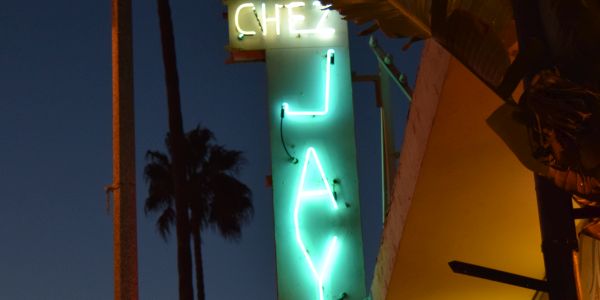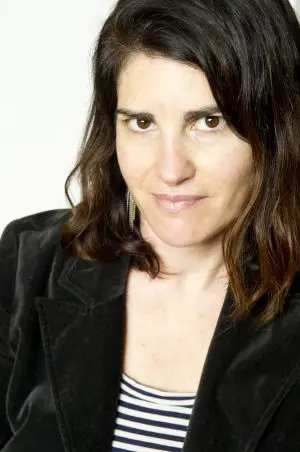Dinner With Dames: Dinner #2, With Jessica Sharzer (Recap)

All articles contributed by people outside of our team are…
Dinner with Dames Case File
Who: Jessica Sharzer, writer of Nerve and American Horror Story, with Cinefemme board, fiscal sponsorees, and referrals – Ritza Bloom, Shenee Howard, Katy Kavanaugh, Jen Mostow, Katrina Parks, Jenna Payne, and myself, Rory Gory
What: Dinner 1.1 – a casual discussion on industry issues facing women and ways to excel in their careers over dinner and drinks
When: Tuesday, October 4, 2016
Where: Chez Jay
Why: To propel women to bigger and better career opportunities within studios and networks
At every single point in my career as a writer and director, filmmaking has been in a state of rapid transformation. My career began when I was 19 years old, after moving out to Chicago in part to do an Americorps program but mostly to find adventure. I had baked cupcakes, my girlfriend was adorned in zombie makeup, our friend had brought over her brand new mini-DV camera, and I found myself the ringleader of a bizarre experimental short, Cupcake. I remember that moment in the middle of the shoot thinking – this is what I want to do with my life.
My concentration at the School of the Art Institute of Chicago was in “Film, Video, and New Media” at a time when those were three different mediums instead of one. Film purists existed in abundance, loudly trying to stop the tides from changing. I shot a short on 16mm, assuming that success could be found by emulating the careers of independent filmmakers who came before me. Shoot an innovative short. Go to a festival. Get your big break. Wear sunglasses on a beach in France.

After finishing my degree studying experimental film in Berlin and graduating during the market crash, the only place I could wear sunglasses was at my parents’ house in Boston. Gear had changed, software had changed, and everything I had learned was obsolete. I shot various music videos, edited a webseries, and watched mumblecore films, assuming that success could be found by replicating the careers of my contemporaries. I wrote, directed, and produced a feature film, The Audience, to break in. While that feature was not a meal ticket, I did end up in LA, consulting for nonprofits working to fight gender inequity in the film industry, including the Alliance of Women Directors and Cinefemme.
On October 4th, Cinefemme’s Dinner With Dames hosted their second mentorship dinner with Jessica Sharzer, writer of Nerve and American Horror Story. Her background was especially fascinating to me, as someone who launched her career with a short film directly out of NYU, and who now helps to run the writers room on Lee Daniels’ new Fox series Star. Even better, one of her directing credits was an episode of The L Word. I was so excited to ask her, how do you balance a passion for both directing and writing?
She described her journey as a writer and a director, and discussed how becoming a mother shaped her career. As a young director, her writing process was labor intensive, finding the story through endless rewrites. As a single mom with a demanding career as a writer, her process shifted, and she scheduled her time rigorously to manage many high profile projects simultaneously. Her tips for fast writing inspired Shenee Howard, Ritza Bloom, and myself to mimic her process in our writing group.

Dinner With Dames Program Director Jenna Payne asked about how to stand out at an interview, and Jessica Sharzer emphasized the importance of conversation and connection. Those hiring want to understand who you are because in hiring you, they will likely spend more time with you, working, than with their own families. She discussed how vital it is to fill the room with writers who can collaborate with each other. Katy Kavanaugh mentioned the improv concept of “Yes, and…” as a way to build off of other ideas in the room constructively.
Her openness to share her wisdom and interest in the guests’ varied backgrounds and projects created a lively conversation for the whole dinner. Sharzer emphasized how despite the struggles that diverse candidates face, diversity inevitably makes for the best writers rooms. Difference in opinion and background lend a greater pool of knowledge and creativity to the room, producing the richest stories.
Despite transforming technology and markets, one thing has remained consistent throughout my career: “No one knows anything.” While there are always theories, no one knows definitively what makes something go viral. There is no one way to chart your career, and no one way to get your first break. At a certain point, you learn to enjoy the ride. By surrounding myself with creative peers and inspiring mentors, we’re navigating this ever-changing landscape together.
Video Credits: Footage by: Katy Kavanaugh / Editing by: Kimby Caplan
About Cinefemme:
Cinefemme is a 501(c)(3) non-profit organization founded by women filmmakers, for women filmmakers in 2002. Cinefemme provides fiscal sponsorship to women filmmakers and artists, as well as peer-to-peer networking, mentorship, and strategy for project fundraising. By advancing women’s careers in film and the arts, we empower women’s voices to create gender parity in the arts and equal representation in the media.
About Rory Gory:
 Rory Gory is a non-binary, award-winning writer and director of independent films, music videos, and digital content. Their debut feature film, The Audience, won the Audience Choice Award at the Brooklyn Girl Film Festival. Rory has taken a passion for social justice and filmmaking into the world of marketing, producing content and events for nonprofits such as the LA LGBT Center, United Way of Greater Los Angeles, and The Trevor Project. Rory has served as a board member for nonprofits working to create gender parity in the entertainment industry, including Cinefemme and the Alliance of Women Directors. Rory received a BFA in Experimental Film from the School of the Art Institute of Chicago.
Rory Gory is a non-binary, award-winning writer and director of independent films, music videos, and digital content. Their debut feature film, The Audience, won the Audience Choice Award at the Brooklyn Girl Film Festival. Rory has taken a passion for social justice and filmmaking into the world of marketing, producing content and events for nonprofits such as the LA LGBT Center, United Way of Greater Los Angeles, and The Trevor Project. Rory has served as a board member for nonprofits working to create gender parity in the entertainment industry, including Cinefemme and the Alliance of Women Directors. Rory received a BFA in Experimental Film from the School of the Art Institute of Chicago.
Does content like this matter to you?
Become a Member and support film journalism. Unlock access to all of Film Inquiry`s great articles. Join a community of like-minded readers who are passionate about cinema - get access to our private members Network, give back to independent filmmakers, and more.
All articles contributed by people outside of our team are published through our editorial staff account.













